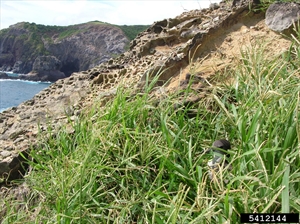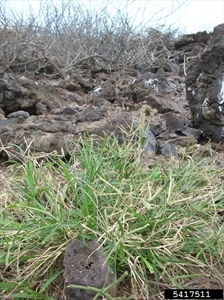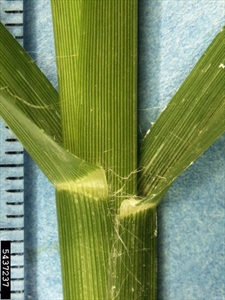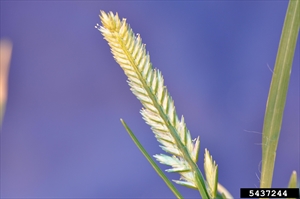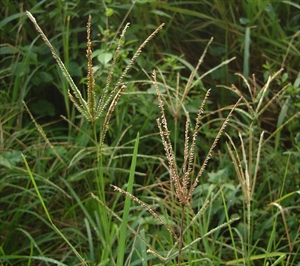- Widespread. Asia, Africa, North, South and Central America, Caribbean, Europe, Oceania. In many Pacific islands.
- Grows vigorously and produces many seeds. Invasive in cultivated (cotton, maize, upland rice, sweet potato and sugarcane) and other disturbed locations and natural areas, such as the margins of natural forests and grasslands, marshes, streams, coastal areas, and roadsides.
- Grows relatively flat, reaching to 40 cm high. Stems and leaf sheaths flattened. Leaves, bright green, up to 15 cm long, flat to V-shaped. Ligule short (at meeting of sheath and blade). Flowers, in spikelets along 3-8 central stems, one usually attached 1 cm below others. Seeds, reddish brown to black. Well-developed root system.
- Spread: seeds; wind; water, contamination of crop seed; on fur of animals, machinery and vehicles.
- Biosecurity: moderately high risk of introduction; seed contaminant.
- Biocontrol: No successes reported.
- Cultural control: hand weed or hoe; vehicle hygiene.
- Chemical control: in Australia: quizalofop-p-ethyl (and Fiji); MCPA (and Fiji); trifluralin; fluazifop; pendimethalin; isoxaflutole; metribuzin; diuron; clethodim; oxyfluorfen; glyphosate. Seek advice on resistance management.
Pacific Pests, Pathogens and Weeds - Online edition
Pacific Pests, Pathogens, Weeds & Pesticides
Crowsfoot grass (461)
Crowsfoot grass; it is also known as crow's foot, goosegrass, bullgrass, crabgrass, wire frass, and many more.
Eleusine indica. It is a member of the Poaceae.
AUTHORS Grahame Jackson & Aradhana Deesh
Adapted from Crowsfoot grass (Eleusine indica) (2018) Weeds of SE Qld and Northern NSW. Lucidcentral. (https://www.lucidcentral.org/editors-pick-animal-and-plant-identification-keys/key-to-weeds-of-se-qld-and-northern-nsw); and additional information from CABI (2019) Eleusine indica (goose grass). Invasive Species Compendium. (https://www.cabi.org/isc/datasheet/20675#toPictures); and from Eleusine indica (2014) Useful Tropical Plants. (http://tropical.theferns.info/viewtropical.php?id=Eleusine+indica). Photos 1&2 Forest and Kim Starr, Starr Environmental, Bugwood.org. Photos 3&4 Bruce Ackley, The Ohio State University, Bugwood.org. Photo 5. Tauʻolunga Eleusine indica, closeup (Wikipedia).
Produced with support from the Australian Centre for International Agricultural Research under project HORT/2016/185: Responding to emerging pest and disease threats to horticulture in the Pacific islands, implemented by the University of Queensland, in association with the Pacific Community and Koronivia Research Station, Ministry of Agriculture, Fiji.
